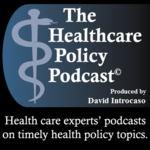
The Healthcare Policy Podcast ® Produced by David Introcaso
The Healthcare Policy Podcast features audio interviews with healthcare policy experts on timely topics.
By registering you agree to Substack's Terms of Service, our Privacy Policy, and our Information Collection Notice